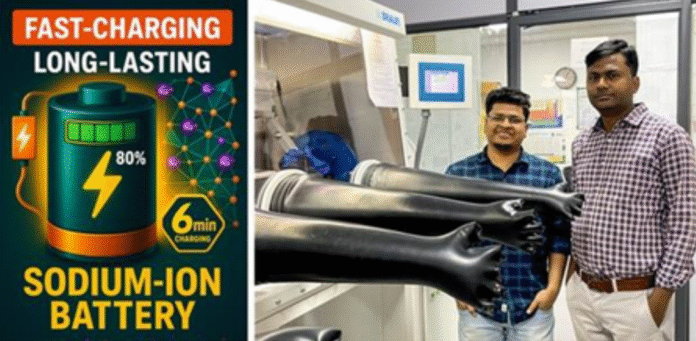New Delhi– In a major breakthrough for energy storage technology, researchers at the Jawaharlal Nehru Centre for Advanced Scientific Research (JNCASR), an autonomous institute under the Department of Science and Technology (DST), have developed a super-fast-charging sodium-ion battery (SIB), the government announced on Monday.
This innovative battery—capable of charging up to 80% in just six minutes and lasting over 3,000 charge cycles—could pave the way for India to achieve self-reliance in battery technology, a critical component of the government’s Atmanirbhar Bharat (self-reliant India) initiative.
Unlike conventional sodium-ion batteries, which typically suffer from slow charging speeds and limited life spans, this new design is based on a NASICON-type cathode and a highly optimized anode. The anode was engineered using a combination of advanced nanotechnology and materials science by a team led by Professor Premkumar Senguttuvan and PhD scholar Biplab Patra.
The researchers enhanced the anode material in three strategic ways: they reduced the particle size to the nanoscale, applied a thin carbon coating, and incorporated a small amount of aluminum to improve conductivity and stability. These modifications significantly accelerated sodium-ion movement, resulting in faster, safer, and more durable battery performance.
As the world rapidly shifts toward electrification—from vehicles to remote villages—the need for affordable, efficient, and safe batteries has become more pressing than ever. While lithium-ion batteries have so far powered the clean energy revolution, their high cost and limited, geopolitically sensitive supply chains pose major challenges.
Sodium, in contrast, is abundant, inexpensive, and widely available, making it an attractive alternative. The newly developed sodium-ion battery could serve a broad range of applications—from electric vehicles and solar energy storage systems to drones and rural electrification—bringing clean power to regions that need it most.
The technology has been rigorously tested using advanced techniques, including electrochemical cycling and quantum simulations. In addition to rapid charging, it offers significant safety advantages, including a reduced risk of fire and performance degradation over time.
While further development is required before commercialization, the Ministry of Science and Technology hailed the discovery as a major step forward in India’s energy independence and clean technology leadership. (Source: IANS)














